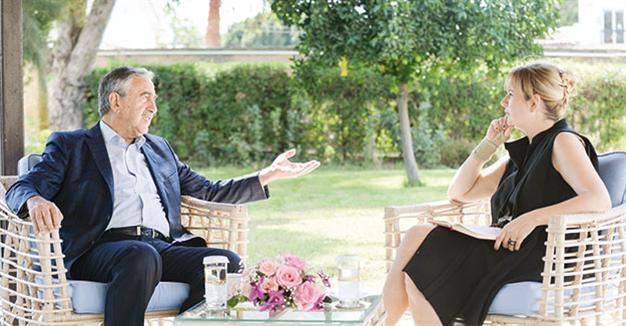Akıncı: No Cyprus deal if no rotating presidency
Cansu Çamlıbel – NICOSIA
 If there is no rotating presidency between the two founding states of a perspective Cypriot federal state, for which accelerated negotiations are being conducted, there will be no peace deal, the leader of the Turkish Cypriots on the eastern Mediterranean island has said.
If there is no rotating presidency between the two founding states of a perspective Cypriot federal state, for which accelerated negotiations are being conducted, there will be no peace deal, the leader of the Turkish Cypriots on the eastern Mediterranean island has said. “A rotating presidency is one of the indispensable topics for the equality of the Turkish Cypriot nation. If the Greek Cypriot side says that ‘the rotating presidency will never be a parameter of the solution,’ then this means there will be no deal,” Turkish Cypriot President Mustafa Akıncı said on Sept. 18 in Nicosia, freshly out of a marathon of eight meetings with Greek Cypriot counterpart Nicos Anastasiades and the U.N.’s special advisor to the island, Espen Barth Eide.
“This means that the Turkish Cypriot leader will in no case sign this [deal] and put it before his nation.”
Akıncı said that the discussion could only be held on “which intervals the rotating presidency can be implemented.”
“But if in principal the point of ‘a rotating presidency will not happen’ continues, this means there will be no deal,” Akıncı reiterated.
The half-century-old Cyprus problem erupted after the island was granted independence from Britain in 1960, soon followed by an outbreak of inter-communal clashes in 1963. The island was ethnically divided between a Greek south and a Turkish north when the Turkish military intervened in 1974 under the terms of the 1960 Treaty of Guarantee after diplomacy failed to end unrest on the island and a coup on the island aimed at unification with Greece.
Efforts to find a peaceful solution to the conflict were relaunched after previously failed peace talks were opened once again in May 2015 following the election of Akıncı as the new president of Turkish Cyprus.
In a Sept. 15 interview with local journalists, Akıncı had said a peace deal could be reached on Cyprus within 90 days if both sides of the divided Mediterranean island were willing and decisive about the issue.
Akıncı and Anastasiades are scheduled to meet U.N. Secretary-General Ban Ki-moon on Sept. 25 in New York in a tripartite meeting, while the United Nations General Assembly is held.
Akıncı said Sept. 15 that negotiations would continue after the meeting in New York with Ban and a multi-partite conference, including the guarantor states, would be held on a later and unspecified date.
Britain, together with Turkey and Greece, is one of the guarantor states of Cyprus under the 1960 treaty.
Citing the possible rise of agriculture due to the Northern Cyprus Water Supply project, which carries water from Turkey’s southern province of Mersin to the Turkish Cypriot administration, Akıncı said that if a deal would not be reached, then the Greek Cypriots could become neighbors with Turkish citizens as Turkish people would possibly move to the Turkish Cypriot side due to the flourishing agriculture.
“If there is no resolution, then the Greek Cypriot side may become neighbors with Turkey on the island,” said Akıncı.
Upon a question of whether he meant that the Turkish Cypriot administration would actually become a part of Turkey, Akıncı said, “I cannot know how the structure would develop after many years. In case of no solution [to the island’s dividedness] we would of course want for the continuation of the TRNC [Turkish Republic of Northern Cyprus - Turkish Cyprus] but the Greek Cypriot side should carefully think where the unrecognized [state of northern Cyprus], embargoes and the deadlock that accompanies [the whole process] will lead the issue to,” said Akıncı.
















